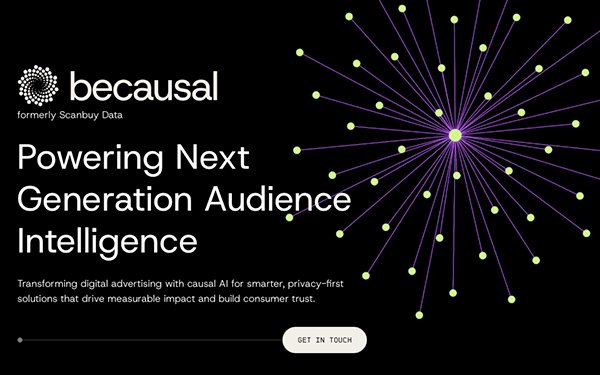
Brands waste billions of dollars on assumptions to target
campaigns. Most are based on correlation signals, but if someone misunderstands how one event can lead to another, the entire decision-making process becomes flawed.
Causal artificial
intelligence (AI) is the next chapter in accountable and predictable ad targeting. It’s the way advertising should work, because it’s not about lumping consumers into audience segments and
guessing an ad will trigger a conversion. It’s about knowing and understanding why the ad worked.
That reasoning became the backbone of Becausal, which launched Monday, rebranded from
Scanbuy’s former data business. The company plans to set new standards for accountability and performance supported by AI. The technology aims to solve longstanding challenges of audience data
transparency and integrity by optimizing campaigns for brands through two offerings: ExtendedAudiences and AuditableAI.
advertisement
advertisement
Avi Chai Outmezguine is CEO at Becausal -- formerly Scanbuy, which
globally supported smart labels, QR codes and mobile engagement, working with PepsiCo and other major brands.
Outmezguine also cofounded Scanbuy. “We made a decision to sell that
business,” he said, mainly because brands did not really trust the data.
Kezzler, a provider of traceability solutions and digital product experiences, acquired Scanbuy’s Smart
Packaging and QR Code consumer engagement business, and Outmezguine created Becausal from the data company left behind.
“From there we went all in with causal intelligence,”
Outmezguine said.
Becausal’s platforms are supported by causal AI, a subset of AI that focuses on understanding and modeling cause-and-effect relationships, moving beyond simply
identifying patterns or correlations in data.
This uncovers what is behind consumer purchase behavior. Causal AI delivers the data through transparent verifiable insight, and also guarantees
compliance and transparency.
The new name, Becausal, came from the idea that “every insight needs an explanation, no assumptions -- we must be able to explain why,” he said.
“There must be a clear cause and effect, not assumptions or correlation. The name also means a call to action to be more accountable and transparent.”
He said the company can now
tell brands what caused what -- and if the process did not occur as intended, how to fix it.
The company plans to expand AI capabilities, global expansion, and additional partnerships. Early
supporters at launch include ad agency Havas as well as CPG company Kellanova, along with about 30 other companies, according to Chuck Ennis, chief commercial officer.
“We’re
looking at millions of shopping baskets that have become part of the audiences we built, and patterns we built are rich in consumer behavior,” Ennis said.
The company analyzes
between 15 million and 16 million shopping baskets monthly across 12 million consumers in the aggregated panel from first- and second-party sources.
No browser cookies are used. This is the
future of ad targeting.
In another example that Ennis provided, the AI finds patterns from store-purchased products on grocery receipts, loyalty cards and other inputs.
The logic is
determined by a runtime audit, U.S. and European compliant, built through AI. The algorithm adjusts, repairs and rebuilds itself based on transparency.
“This is the next generation of
identifiers,” Ennis said. “AI will create the persona of you.”